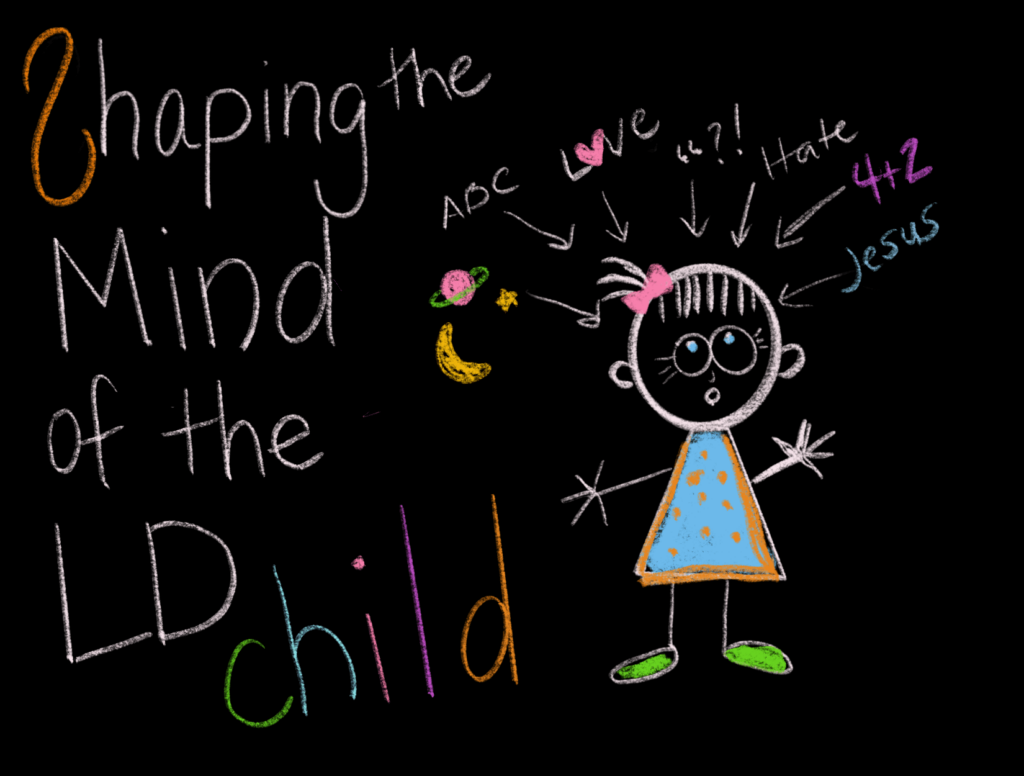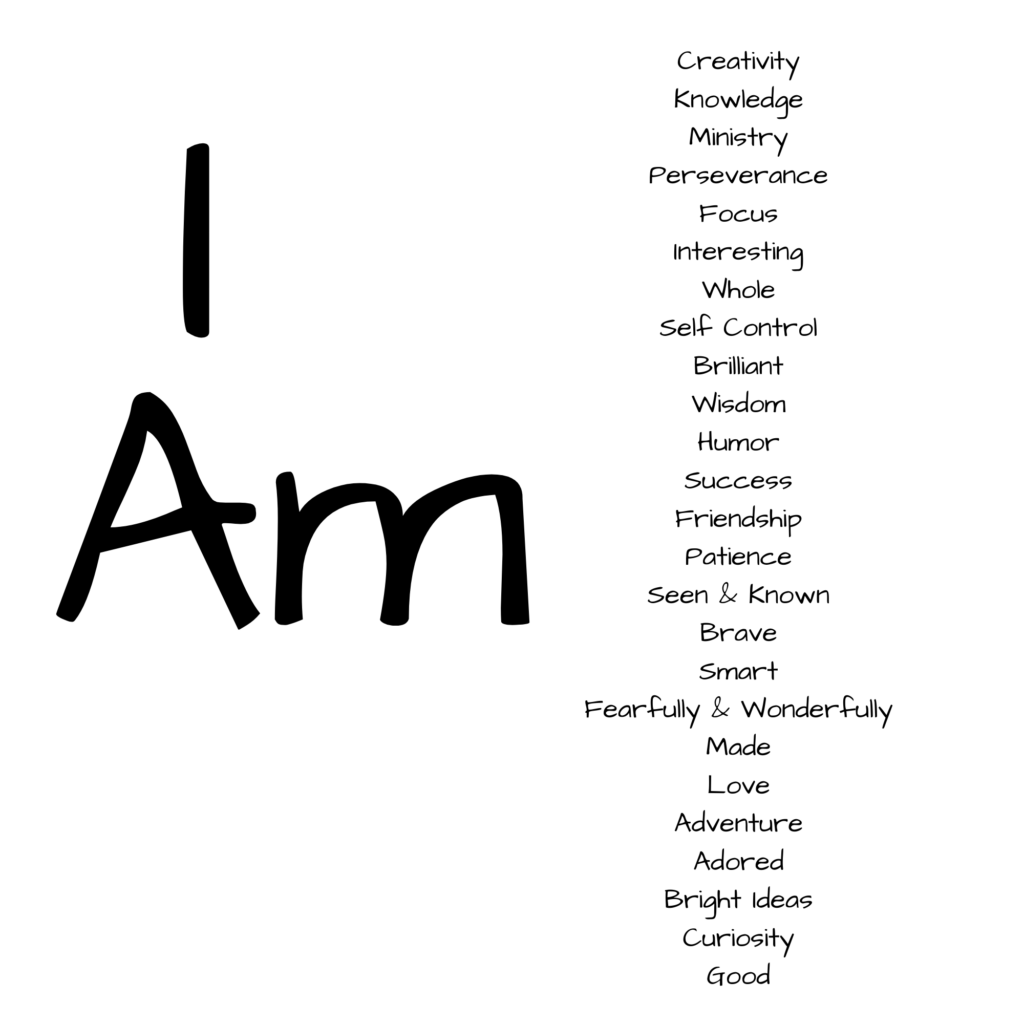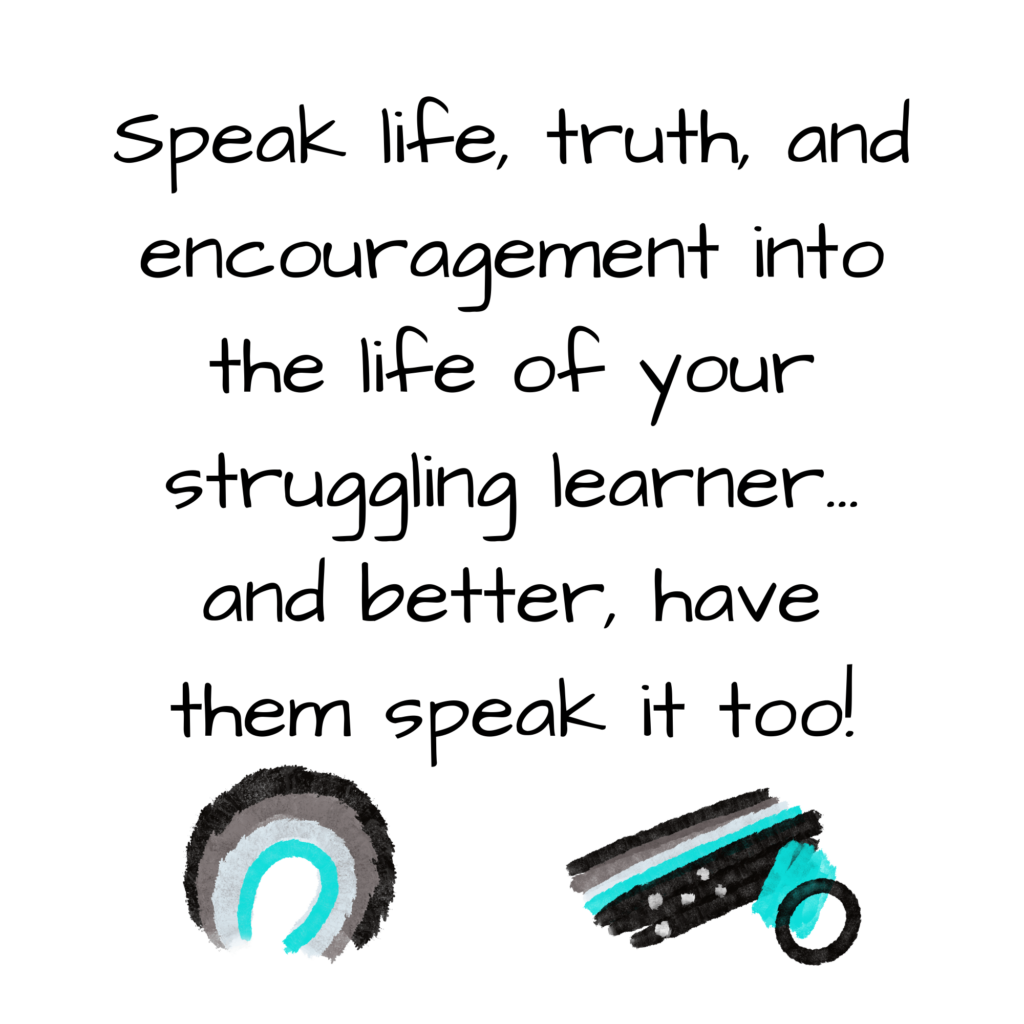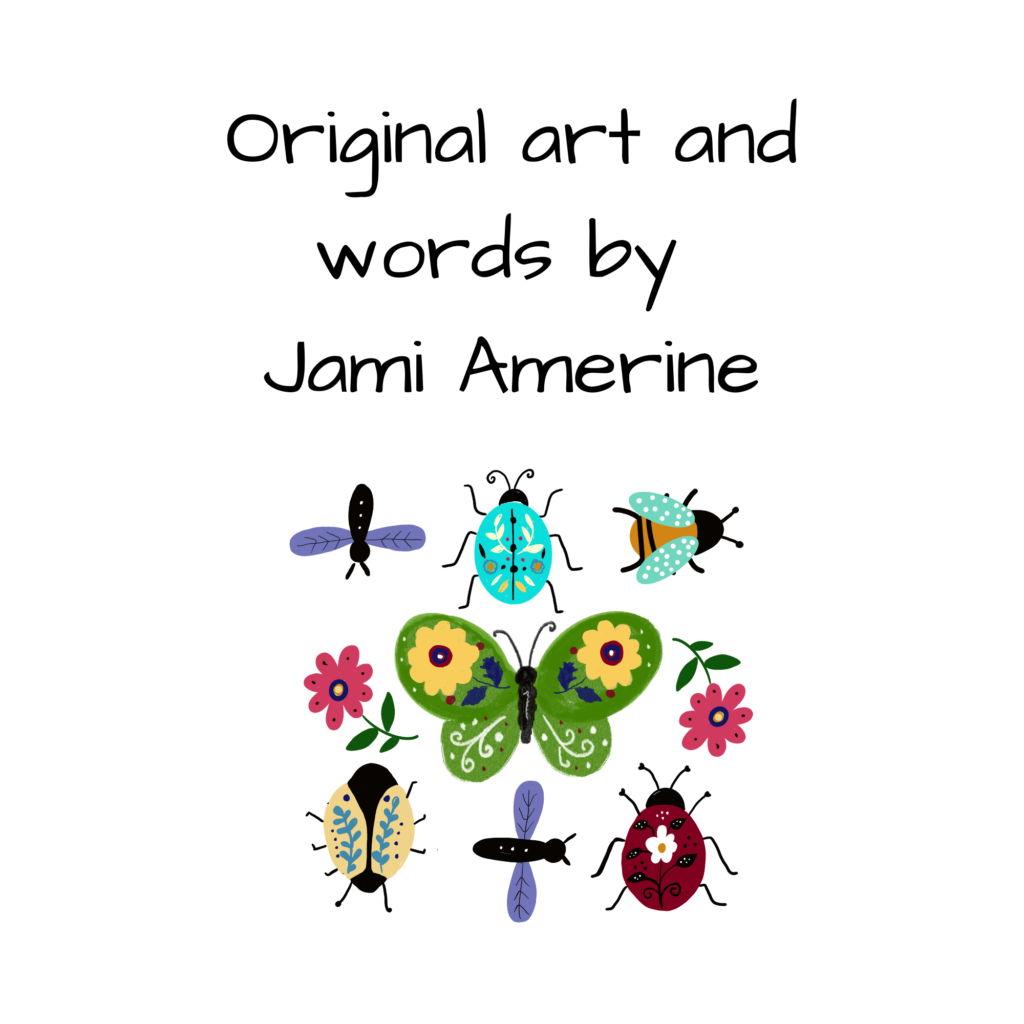
Shaping the Mind of a Disabled Learner
A Fresh Look at Shaping the Mind of a Disabled Learner
Post #2 in the Help! my Child has Learning Disabilities Series
It is never too late to change your mind. I say this to myself a few hundred times a day. My mind is a battlefield. And I remember that not very long ago, my mind was less battlefield and more blood bath.
I believed more in my failures and shortcomings than I believed in God’s power to mold me. A huge obstacle in this battle was believing God. Believing all the things He says about me, His daughter and creation, as truth.
As hard as I was on myself, I did not want anyone to be so hard and awful to one of my kids. But especially one that had it harder than the others.
Seriously, knowing a child is struggling and having no tangible way to protect them, all of the time is bottom feeding work.
However, it occurred to me, not long after our oldest son was diagnosed with several learning disabilities, that he, the child, would have to participate in that protection.
And so, I went to work on John’s mind.
Granted, at first, I went about this all wrong. My first course of action was to get him “healed.” Because I too am a disabled learner, I was keen to all that was ahead of John. But it was a healing prayer event that I first realized my folly.
The person praying with John said, “Lord, we ask that you fix all that is wrong with the processing part of John’s brain.”
I opened my eyes in time to see a look on my young son’s face, a look I won’t ever forget.
The look was basically, “What???”
And it was the first in a series of events where I realized, God doesn’t make mistakes.
Furthermore, it was the beginning of me questioning what it means to be a “disabled learner.”
The next revelation came quickly to mind right after.
My husband, Justin and I were visiting with a wealthy and successful man. In the course of our conversation, he mentioned that his son was recently diagnosed with a learning disability. And he said, “I hate the term learning disabled. The written English language is only about 1400 years old. We teach it as science. And we expect everyone to learn it at the exact same time, exactly the same as the kid next to him on the bus. I was handed the label a long time ago, I remember thinking, ‘that’s not right?’ And I set out to prove everyone wrong.”
He succeeded.
Certainly, everyone is different. But from that point on, I didn’t want to fix John, as much as I wanted John to embrace his creation from a point of pride rather than shame. I wanted to shape his mind, not fix his brain.
There is no shame in the ways God created us. He did not mess up, and He didn’t allow this road by mistake.
So I want to offer this advice in shaping the mind of your LD child with this tidbit, the education standard is not the standard your child was created for.
They, like you, were created for His glory.
Mind Sanctuary
Outside of your home and care, an LD child will be confronted with how they are different. At home, in your sanctuary, they can be continually reminded that they were not created to simply meet the standards of society.
We told John a million stories about successful, groundbreaking humans that overcame hardship to change the world. My dad, who did not read until he was 12, was a chief influencer for John. John witnessed first hand my dad’s successes. And every time, we were quick to remind John, this is what it looks like to succeed when you aren’t exactly like everyone else.
It wasn’t long after this process started that John came to me and asked for me to follow him to the tree house. There he showed me the water filtration system he had built. Tubes, duct tape, and my favorite teapot (ugh) lined the tree and followed a pipe up to the top of the old cedar tree.
He had drawn and developed a way to bring clean water to his hideout.
And, it worked. Granted, it needed some help, and Justin was able to help him complete it. But it is important to note, John was 9 at the time. And, he could not read. He could not complete 4 kindergarten level math problems, and his handwriting was two levels below chicken scratch.
1500 years ago, what would have been more valuable? The ability to read, “See Jane run.” or the ability and mind set that helps someone bring clean water to his family?
Right. And so this is when we truly switched our focus from what was “wrong” with John’s mind, to what was right.
No, we didn’t give up on reading and math, but we were quick to emphasize all that was right instead of focusing entirely with what was wrong. And I know that it can be all-consuming, but foremost in my humble advice is, I can change my mind and the mind of my of child about learning.
We are learning something all the time. It can be by accident, say if you forget to add an ingredient to a recipe or blow through a stop sign on an unfamiliar street. We learn from experience and inexperience. Our mind is changed from the experience.
But the modern culture of teaching and learning in the scope of creation is rather new, so we approached John with those facts.
Not to cause rebellion, but to teach him this is not what you were created to conform to.
We said it until we were blue in the face. Similarly to the scripture, the Sabbath was created for man, not man for the Sabbath. The grand design of humanity was not created to learn the alphabet. The alphabet was created to help man communicate. And then, we made the alphabet the law. Under the law, we are servants to something obscure, something that doesn’t always look like ABC, but instead, CBA.
But John could communicate, in fact, he was an excellent communicator. He was polite and kind. He used words that built other people up, while the world was using words about him, that tore him down, and described him as lacking.
This motivated and fascinated me.
And, it also made me question many of the practices society used to mold or “mend” the learners below the imaginary curve.
Consequences vs. Punishment in the Mind of the LD Child
The example I am going to use might bring a twinge of offense, but sometimes a little shock goes a long way in changing our minds. Please know, I am not criticizing advanced learners. I have one, I know that there are challenges here too. But this was another huge catalyst in my formulation of beliefs.
It was a friend of a friend who first told me about a gifted learning program at a local school. The entire fourth grade was studying a unit on Marine life. The class was together for 80% of the teaching. But for the rest of the instruction time, the gifted class went to the university to dissect an octopus and then they traveled for two nights to go to a behind the scenes look at SeaWorld.
The woman, whose child was in the gifted program just raved about the lengths the school had gone in teaching with such thoroughness. Her child was now certain she would want to study Marine Biology.
And this was my question, “what did the other kids do while the gifted kids were at these advanced supplemental experiences?”
Her response was, “oh, they just did study hall.”
Let’s break this down in the mind of a kid, “I am not as smart as the gifted kids. They earn opportunities to learn, I am not allowed to do that because something is wrong with me.”
Learning is a privilege, but I propose that a system that rewards the smart and punishes the struggling, by leaving them out of learning experiences, further destroys the desire to learn.
And I will talk about advocating for LD children later, but for now, this is the point.
What society tells the LD learner is they are different for bad reasons. In your home, the mantra can be the opposite. They are different for a good reason.
A Different Mind…
Different is good.
And while it may not feel like it, it is a truth proven by groundbreaking thinkers, like Albert Einstein.
[bctt tweet=”What society tells the LD learner is they are different for bad reasons. In your home, the mantra can be the opposite. They are different for a good reason. #learningdisabilities ” username=”httpstwittercomjamiamerine”]
I believe strongly that anything that looks or feels like a punishment in the ways of learning is categorically detrimental. A loss of privilege for failing a spelling test only adds to the LD learners perception of learning and themselves.
And I also feel very strongly that parents can be the voice that counteracts this folly. As a 4th grader, I missed dozens of recesses because of my math worksheets. What I remember about that was, I didn’t understand the concepts. And I knew that if I didn’t grasp them, I was going to have to stay in the classroom while everyone else got a break. This compounded the stress on me and my work, a vicious cycle of defeat.
If you touch a hot stove your hand gets burned and you don’t do that again.
If I fail this assignment I don’t get to go outside… but I can’t figure it out, and I need a break, and I want to be like everyone else, and… the process of long division is further from the reach of a child who now is also factoring their detriment.
Please note, motivating a child with reward or loss can be effective, but I propose this does not apply when the child is not capable of doing the task before them. In my opinion, this is like punishing a 5-month-old for soiling their diaper.
And I will admit, we had a star chart for John. If you get your spelling words right you get… but this was lost on him because, at the time, none of the things he was “supposed” to be able to spell were within his scope of abilities.
On a different scale, I attended a private university. Because of my low math scores, I had to take non-credit remedial math courses at the same cost as my other courses. I could not solve for X, but I knew I didn’t want to pay $5000 for a class that didn’t count towards my degree.
Did this motivate me? Yes. Could I then solve for X. Nope.
The Developmental Mind
In fact, I was 38 years old before I finally was able to teach and comprehend Algebra. I do not know why this switch turned on. I propose, were I to ever get my Doctorate in Education, this would be my thesis, “Developmental Algebra: The Age Appropriate Methodology of Math Comprehension.”
Also, at 47, I still don’t use Algebra. But that isn’t the point either.
The point is that we live in a society that rewards. If you go to work you get paid. And if you do a good job, you advance, perhaps make more money than someone who is not doing their work.
But if we take this principle and apply it to say, an autistic child it crumbles. If you behave at the restaurant, we will go out for ice cream afterward. And then, a waiter drops a tray, the sound startles the child, and they begin to cry uncontrollably. Unable to calm her, the family is forced to leave their uneaten dinner and no ice cream.
But none of the factors involved in the incident are within the child’s ability to control.
And yes, this is much different than a spelling test, but, is it? There is no point in trying to fix what isn’t broken. Chief in this statement is changing our minds, not the child’s.
A fit in a restaurant is a normal occurrence in the life of an autistic child and his or her family. Society may not like it, but society doesn’t have the last word. I propose the privilege of dining out comes with the risk of a meltdown, that is just life. I could just as easily belch at the table. No, I don’t want to. It might be embarrassing, and yes, if I did it on purpose, then there would be room for correction. But never taking me out in public again or forbidding me from having ice cream doesn’t mean I might not have to burp again.
Changing our minds about disabilities increased John’s confidence in himself, even when he was no longer in our home or schooling at the dining room table.
John had a foreign language teacher that worked pretty hard at convincing him he was an idiot. I still cringe at some of the stuff she said to him, the worst was, “You’ve barely grasped English, it is ridiculous for you to pursue a foreign language.” But at home, when he told us this and we asked him what he thought, his answer was always the same, “She doesn’t know me, and she doesn’t know all the things I will do and accomplish.”
Our words, ones he couldn’t spell, but were entirely ingrained in him.
Where I felt most powerless in helping my LD child, I was most effective in teaching him the truth of who he was. And this was a tireless effort. This was my greatest teaching, you are more than this diagnosis.
An atmosphere of lightheartedness, as discussed in the first post in this series, and a constant mantra of “this struggle doesn’t define you,” went much further in advancing John than solely focusing on the problems.
And while I do not propose that it is always this simple, I do remember John NEVER came to us with shame or worry when it came to school work. He never hid or fretted over a failing grade. I attribute this to the fact that we never punished or ostracized for below average grades.
He knew that a big red D on an assignment was not a defining factor in who he was.
Yes, he knew it meant repeating the work. And he was fully aware when he was in the same grade as his younger brother. But he also knew, it wasn’t the end of the story.
What is the old saying about the forest for the trees? It applies here. If the entire scope of my focus had been John’s lacking, I would have missed everything plentiful that he was and is.
These attributes, that were encouraged and poured into John, are the same things that he is most proficient in as an adult.
Childhood is a blip on the screen of a life lived wholly loved and appreciated.
The Mom Mind
What the education system did to my mom-heart was put it into categories of age, ability, and pass/fail, and I don’t say that to criticize education. This system works effectively in many ways. But what I purpose is that in your home, those categories do not apply. And by removing those barriers, through word and deed, we can arm our children with a concept of their identity that is not lacking where it counts most, character.
This is where the greatest teachers and administrators in the education system shine. It is those humans that embrace differences and challenges as beneficial instead of detrimental.
I refer to my friend Carey Scott, author of the book Unafraid. Something that Carey teaches, that is so important to me is, “guilt is being sorry for something you have done, shame is being sorry for who you are.”
Our children can feel remorse or guilt that their efforts were not enough or failing. What I never want for any of my children is to feel shame for who they are. There is no shame in their creation.
There is a big difference between a child not trying or failing to study or prepare and a child fully being developmentally incapable of a particular success. A capable learner can assume guilt for not applying themselves. A disabled learner only takes on the burden of shame when they are lead to believe that the essence of who they are, manifested the failure.
And this is where I feel most convicted about changing our minds about shaping the mind of an LD child.
There is nothing wrong with your baby’s creation. He or she was planned, and no, I am not referring to a failed scorecard in the ways of birth control.
But the design and impact of their life in the world was not left to chance. Again I say to you, God doesn’t make mistakes. In this life, we will all face hardships. What we believe about ourselves and our children goes a long way in developing character that can hear and experience the message “there is something wrong with you…” and know in their heart, “that isn’t true.”
I do not propose that you sign your child up for math camp if they can’t differentiate a two from a seven. But I do propose that if they crave math camp, they are never told, it isn’t possible. I also know, sometimes, you may have to agree to math camp through gritted teeth and a spirit of terror. However, and this is key, failure is always an option.
Winning anything is wasted on someone who never loses.
And, without being too cliche, a butterfly that is cut out of its chrysalis, so that it doesn’t have the natural process of growing from the struggle, dies. I am not suggesting the dumbing down of societal standards or scholastic ones. But I am suggesting that in your home you can redefine what your LD learner perceives as truth about the world, and themselves.
Stay tuned for post three, Social Hurdles for the Learning Disabled Child.
May your floors be sticky and your calling ordained! Love, Jami
You can read post one here.
Get your I am Cards for Struggling Learners here now! Speak life and truth into your baby!
I have made this set of “I am cards” from journal entries I had when John was just a boy. I am in awe of the work that God had before John and I even realized it was to be. Things no eye had seen. literally no ear had heard. I know that you might be scared with all that is before you with a struggling learner. So, I pray these cards offer you hope in the future God has planned for you and your child.
I recommend printing these on card stock and cutting them in half.
Get them here!
You can find my books by following the links below!













[…] I stated before in one of the previous LD posts, some things don’t need to be fixed. […]
I LOVE this blog!!! When you were barely one you were speaking in full sentences and cracking us up! You drew us fascinating pictures and did amazing things. But, then came school! When I asked if you might have a Learning Disability, they blew me off, telling me girls “never” have learning disabilities! (really?) There was so little help, and so much judgement of what “I” was doing wrong! But, you were “Wonderfully, and perfectly made” all along! And God has had purpose in every tear…both yours and mine. Thank you, Jesus!
[…] Two: Shaping the Mind of the LD Child […]
[…] Shaping the mind of the LD child […]